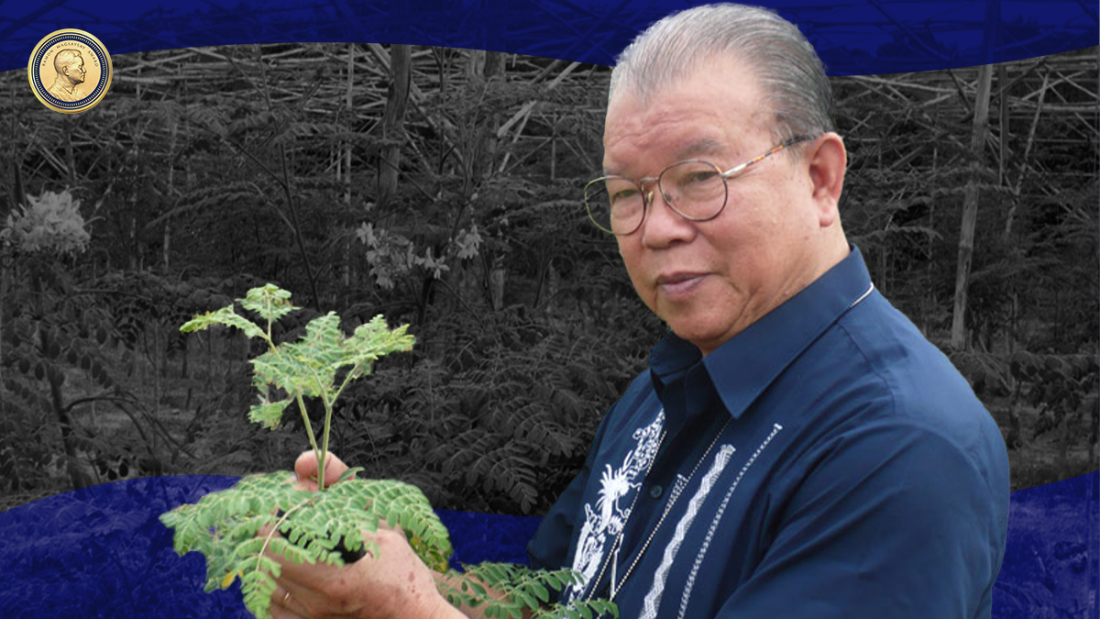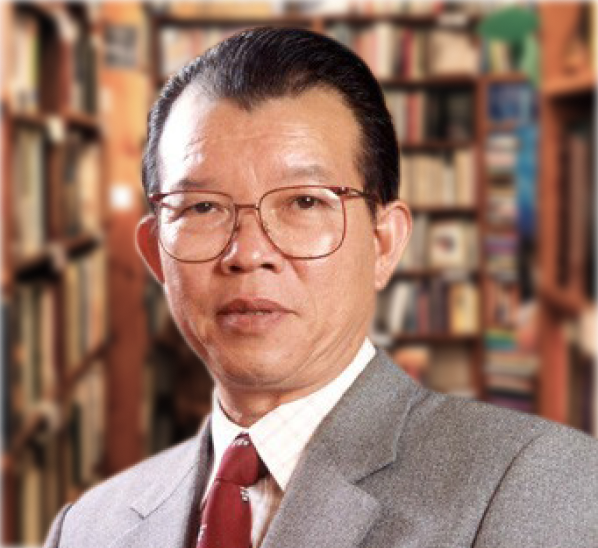- Still abroad when the Saigon government collapsed, XUAN elected to forsake safer and more lucrative possibilities elsewhere and returned home to resume his post at Cantho.
- XUAN pondered the lessons of “farming systems analysis.” Crop yields increase, he noted, when Land tenure is secure and when the state interferes as little as possible in determining prices and distributing essential inputs.
- 52-year-old XUAN uses his higher profile to plead the cause of Vietnam’s rural folk and to promote better training for the country’s up-and-coming scientists.
- The RMAF board of trustees recognizes his combining practical scientific research and effective advocacy to improve the lives of Vietnam’s farmers.
Everywhere in Asia farmers are called upon not only to feed their growing nations but also to produce rice and other commodities for export. In Vietnam, efforts to meet this challenge are complicated by the troubling legacies of recent war and economic policies that stifled individual enterprise and inadvertently limited growth. Helping Vietnam’s farmers to overcome these impediments, and to thrive, has been the life’s work of VO-TONG XUAN.
Born to a poor family in southern Vietnam, XUAN learned English as a boy and won a scholarship to the University of the Philippines in Los Banos. He earned his bachelor’s and master’s degrees in agricultural chemistry and was appointed research fellow at the nearby International Rice Research Institute (IRRI). Returning to South Vietnam in 1971, XUAN joined the faculty of the University of Cantho and headed the department of Agronomy. He completed his PhD at Kyushu University in 1975.
Still abroad when the Saigon government collapsed, XUAN elected to forsake safer and more lucrative possibilities elsewhere and returned home to resume his post at Cantho. Overcoming administrative and political obstacles in the now reunified Socialist Republic of Vietnam, he managed to extend his activities beyond the university and into the fields. A soil scientist, he explained, needs to be with farmers.
Understanding the complex environment of the individual farmer was the key, XUAN thought, to improving his country’s agricultural productivity. With farmers, he studied the intricate relationships between soil and water, plants and animals, machines, credit, markets, and government, indeed even between men and women—the whole “farming system.” This holistic approach yielded more practical solutions to farmers’ problems than those suggested by the more narrowly scientific approach, or by ideology. Through extension work and weekly radio and TV programs, XUAN introduced his innovations to farmers. They succeeded, and XUAN’s credibility rose.
XUAN pondered the lessons of “farming systems analysis.” Crop yields increase, he noted, when land tenure is secure and when the state interferes as little as possible in determining prices and distributing essential inputs. Moreover, farmers are more likely to invest in new tools and machines if they are permitted to own them themselves. Genial and self-effacing, XUAN worked patiently within the system to promote such reforms. His efforts were timely. New policies providing for long-term land leases and production incentives in 1989 led to Vietnam’s first post-war rice boom and yielded a large surplus for export. XUAN cautioned, however, that further reforms and vast improvements to the rural infrastructure are needed to sustain such a boon.
Despite the country’s isolation, XUAN assiduously cultivated Vietnam’s links to the outside world. He attended international meetings and arranged scholarships abroad for his promising young faculty members. With his help, international NGOs established grass-roots programs in Vietnam, and IRRI resumed its research there. In 1988, he helped to found the region-wide Asian Farming Systems Association. In time, XUAN became vice-rector of the university and won a seat in Vietnam’s National Assembly.
Today, 52-year-old XUAN uses his higher profile to plead the cause of Vietnam’s rural folk and to promote better training for the country’s up-and-coming scientists. Still a working scientist himself, he stays attuned to life on the farm and to promising new developments: nowadays, small-scale agro-industries are blossoming everywhere in the countryside.
In electing VO-TONG XUAN to receive the 1993 Ramon Magsaysay Award for Government Service, the Board of Trustees recognizes his combining practical scientific research and effective advocacy to improve the lives of Vietnam’s farmers.
This is a great moment for me to be bestowed this award named after the great president of the Philippines, Ramon Magsaysay. President Magsaysay won the hearts of the Filipino people because “he cared for all people as individuals and believed in their dignity and importance.” His great ideals inspired my own thinking during my student days at the University of the Philippines at Los Baños during the 1960s. With my wife, I strove to belong to the circle of those who place the interests of the people above all things in life.
As a youth from a poor family, I had to work to supplement my parents’ meager income, to help take care of my two brothers and three sisters, and to support myself in school. As a newspaper boy, I hopped from one passenger bus to another early every morning. At night, I tutored children who were better off than I was. I learned to treasure the value of labor and I determined to work on the side of the less privileged people in my country. In particular, I was determined to help educate millions of Vietnamese in the vital field of agriculture, and to imbue them not only with technical competence but also with ideals that promote national development.
I presented my Doctor of Agriculture dissertation at Kyushu University in 1975, just before the end of the Vietnam War. I then found myself rushing home even as thousands of Vietnamese were fleeing in the other direction.
The first two months under the new government were full of joy and anxiety: joy because the Vietnamese nation was finally unified, but anxiety because of uncertainty about whether people who worked under the old government would be welcome to participate in the postwar reconstruction. But the new university leaders started assigning me responsibilities and I soon found out that the ideas of my life converged with the goal of the new government: “For the happiness of the people.” This ideal has given me and my wife magical strength to overcome most of the difficulties and inconveniences in our life.
Peace in the Mekong Delta allowed agricultural scientists to infiltrate areas that had been untouchable during the war. We walked through thousands of hectares of burnt rice fields, withered forests, and deserted meadows. We traveled by sampan, bicycle, and motorcycle; sometimes we had to cling to the door of the last passenger bus. Yet we did not feel exhausted. On the contrary, we felt happy because each day we grew professionally and accumulated practical experiences that were not available in our textbooks. From these encounters with reality, I could see why the lack of appropriate science and technology was the main cause of the backwardness of agricultural development of the Mekong Delta.
I therefore concentrated on two things: first, training agricultural graduates and agricultural extension agents in research in food production, particularly pest-resistant rice varieties and integrated farming techniques on difficult soils; and second, transferring appropriate technologies to government administrators who administered the country’s food production plans.
At the university, I integrated classroom instruction with scientific research and extension work. Outside the university, I concentrated on multifaceted agricultural extension projects: from weekly TV programs to informal lectures during provincial or district cadres’ meetings; from discussions with top political leaders to talks with farmers. Eventually, I was able to convince the government to adopt agricultural policies that stimulate farmers to use new technologies for improving household incomes. Today I feel happy seeing the successes of our students who have become young cadres working in the agricultural offices of their respective localities, and I am even happier seeing the smiles of our collaborating farmers.
Obviously, these successes do not belong to myself alone but to a larger body of people. Being elected the 1993 Ramon Magsaysay awardee for government service, I recognize that this great honor must be accredited first to the doi moi (renovation) policy of the Vietnamese government leaders who have approved and supported my ideas, and to my colleagues and sympathizers who have been collaborating with me in putting my ideas into reality. Many high officials in the Council of Ministers, the Ministry of Education and Training, the Ministry of Agriculture, the provincial and district governments, and the University of Cantho have been promoting my work and reiterating my faith in the bright future of Vietnam. My collaborators include colleagues at the University of Cantho; undergraduate and postgraduate students now working in various agricultural organizations in the country; scientists in various provinces of Vietnam; many foreign experts and leaders of several international organizations; many newspaper, radio, and TV reporters; and, of course, the farmers of Vietnam themselves.
Finally, I wish to dedicate this honor to my parents, to my wife and three children, and to my brothers and sisters who have sacrificed long days, weeks, and months without their son, husband, father, and brother so that I could devote my time to serve other people. My wife, particularly, has been the most steadfast home base, always managing things to make sure that any plan I am involved in can be accomplished.
The road ahead is still far and full of humps and potholes. But the path we have chartered, I believe, will create a new environment for the Vietnamese people to move faster toward prosperity. I pledge to try my best to continue the work I have chosen for so that I can be forever proud of this prestigious award, and so that I can live up to the expectations of the people I mentioned above and of the Ramon Magsaysay Ward Foundation, to whom I am very grateful. I beg your continuing patience and valuable support to help me fulfill my ideal.
Related Articles

A Tribute to 1993 Ramon Magsaysay Awardee Vo-Tong Xuan
Aug 20, 2024

